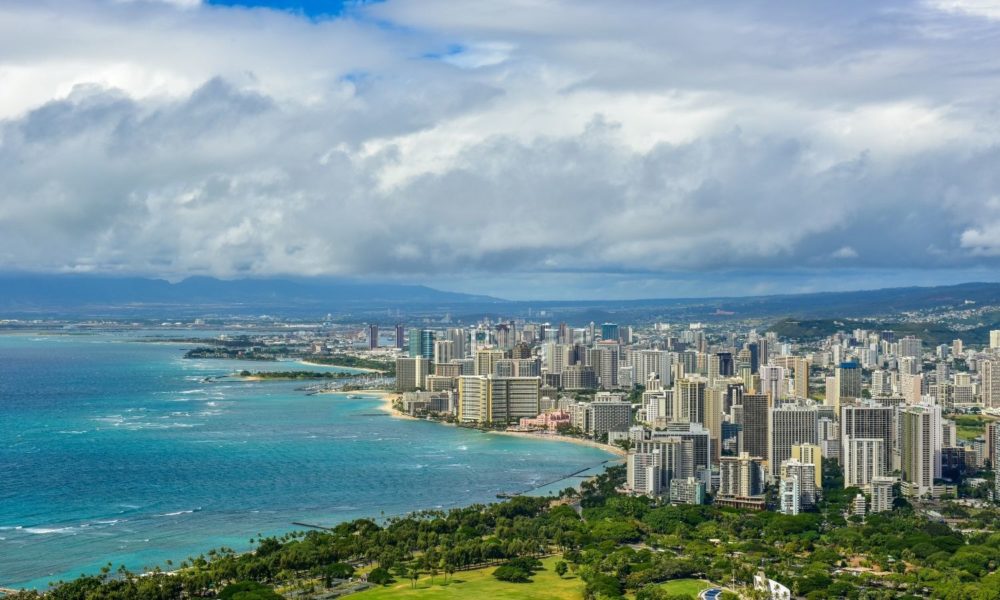History was made in Hawai’i recently when a state judge ruled that a lawsuit seeking damages from major oil and gas companies for their climate disinformation campaigns can move forward in state court. The ruling sets an important precedent that the fossil fuel industry has been fighting to prevent in similar cases across the country.
The case against ExxonMobil, Chevron, Sunoco, Shell Oil, and other companies argues that major oil and gas producers have worked for decades to deceive the public and policymakers about the devastating impacts of climate change. As a result, the lawsuit claims, communities in Hawai’i are now facing increased flooding, more extreme weather events, and rising seas. Under the current emissions trajectory, the state is threatened by more than three feet of sea level rise within the century which could put more than $19.6 billion of land and infrastructure at risk. As the lawsuit charges, these impacts were not inevitable and were exacerbated by the fossil fuel companies’ deliberate decisions to hide findings and sow public mistrust in climate science to prevent action to address climate change.
UCS research has shown that scientists at major fossil fuel companies have understood the connection between their products and climate change for more than five decades. Instead of addressing the looming global crisis their companies were helping to create, decisionmakers at these major fossil fuel companies chose to actively downplay and distort the mounting evidence of climate change. These industry leaders mounted campaigns to block climate action. As UCS has detailed in the disinformation playbook, the fossil fuel industry and its industry trade groups have harassed scientists and manufactured uncertainty with no scientific basis. Unfortunately, many of these deceptive tactics by the fossil fuel industry continue today. Lawsuits such as the one brought in Hawai’i seek to expose them and hold the companies accountable for their deception.
The importance of the Hawai’i victory
What makes the Hawaiian ruling so notable is that it is the first climate disinformation case to move to the legal “discovery” phase in which the companies charged will be forced to disclose internal company documents and correspondence. In this case, lawyers for the fossil fuel companies pushed three separate motions to try to dismiss the lawsuit and failed all three times.
The ruling marks a major victory in the broader legal battle to hold fossil fuel companies accountable for the costs of climate change. Dozens of similar cases in the United States are now pending that also seek to hold oil and gas companies accountable for their intentional decisions to spread disinformation. The Hawaiian ruling marks an important precedent for them and could potentially reveal important truths about industry actions that could influence those cases as well.
During tobacco litigation in the United States, scores of cases against tobacco companies were dismissed before one brought by the state of Minnesota finally went through the discovery process and succeeded in bringing to light internal tobacco company documents. The internal documents, combined with grassroots campaigning, played a major role in eventually forcing tobacco companies to shut down their lobbying arm, cease certain of their marketing tactics, and pay out billions of dollars in damages and penalties.
In the legal case in Hawai’i, the city and county of Honolulu filed a lawsuit in March 2020 and have been working in the courts for the last two years. Honolulu City Council member Radiant Cordero said the new ruling exposes the fact that these large fossil fuel companies, “value their own profit over public health and safety. With these rulings,” she said, the city and county of Honolulu are creating “a precedent of accountability and justice” to make sure “these endangering actions will not go unnoticed.”
A growing movement
Climate litigation such as the Hawai’i case is designed to ensure that we have a livable future and that companies responsible for the majority of the world’s greenhouse gas emissions are held accountable. These cases require community buy-in, scientific expertise, legal scholarship, persistence, and fortitude to challenge some of the wealthiest companies in the world.
They also require a good deal of technical support and public education. In May 2019, for example, UCS co-sponsored a public forum on the climate liability of fossil fuel companies with the University of Hawai’i School of Law and the Center for Climate Integrity. UCS also briefed Honolulu city, county, and state officials to promote understanding of climate attribution science and the legal liability of fossil fuel companies.
As this case moves forward, it is important to both celebrate the victory and plan for the work ahead. As climate cases move into their next stages in the United States, there will be an increased need for robust scientific information and qualified experts. If you are interested in learning more about the role of science in climate litigation visit the Science Hub for Climate Litigation.
Honolulu City Council Chair Tommy Waters captured the significance of the ruling, noting: “This is a big and important win. Not only in the sense of legal justice, but also for our local residents. We are facing incredible costs to move critical infrastructure away from our coasts and out of flood zones, and the oil companies that deceived the public for decades should be the ones helping pick up the tab for those costs—not our taxpayers. The reason these companies are fighting so hard to block this case is they don’t want even more evidence to come out. This is just like Big Tobacco, when they tried to take advantage of the public. I will not stand for this and will continue to fight for the preservation of our communities.”
The words ring true for communities across the world. In the United States, dozens of communities are now working to move similar legal cases forward. The attorneys general of Connecticut, Delaware, Massachusetts, Minnesota, Rhode Island, Vermont, and the District of Columbia, as well as 20 city and county governments, have filed lawsuits to hold major fossil fuel companies accountable for their deceptive practices and their role in climate change.
Experts interested in working to inform these efforts by working with the Science Hub for Climate Litigation can sign up here.

